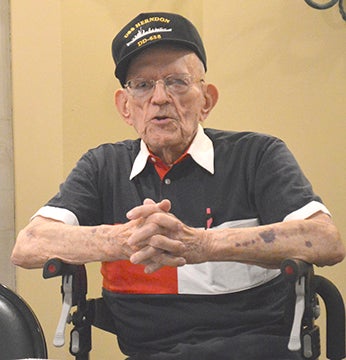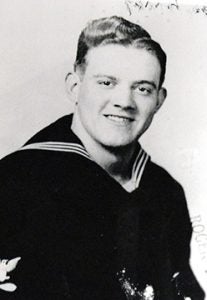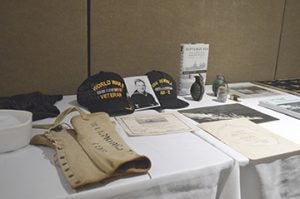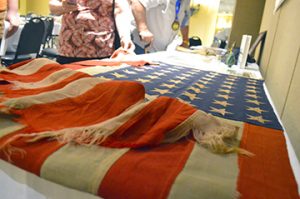WWII hero Wilmore who was aboard the USS Herndon talks to Sertoma Club
Published 11:27 am Friday, April 14, 2017

- U.S. Navy veteran Tom Wilmore shares his World War II story with members of the Port Arthur Noon Sertoma Club in Port Neches on Thursday. Mary Meaux/The News
PORT NECHES — Tom Wilmore often finds it difficult to talk about World War II and his time aboard the destroyer, USS Herndon.
“I didn’t do this for years and years ‘cause I go to crying and I can’t talk if I’m crying,” Wilmore, now 92, told a hushed room at The Pompano Club where he was guest speaker at the Port Arthur Noon Sertoma club meeting on Thursday.
Wilmore, wearing a patriotic navy blue shirt with distinctive red and white markings, warned the group he may have to change the subject should he become emotional.

Tom Wilmore had this photo taken during WWII and sent to his father when he realized the battles were building up to a major event.
His tale meandered some as he told of how, at age 17, he left school and volunteered for the U.S. Navy and found himself stationed aboard the famous destroyer ship off Omaha Beach on D-Day, ahead of the first assault waves.
A Louisiana native who lived in Port Arthur and now resides in Port Neches, Wilmore spent from September 1943 to September 1944 aboard the ship.
While in the service, his leaders learned of his skills with a rifle and later of his aptitude with mechanics and he was assigned to torpedo school.
He also remembers getting sick on the destroyer.
“I got sick. I had never been on an ocean like that before,” Wilmore said. “I was told to eat what you like and I like crackers with the peanut butter on them.”
The crackers helped ease his stomach ailment and he kept them around, he said.
For about nine months, Wilmore and other sailors worked to help escort troopships across the Atlantic to British ports for the buildup for the invasion.
“Things were starting to build up (in the war),” he said. “So I wrote a letter to my dad and told him to keep the radio on. I went and got a picture done and mailed it to my dad. I knew something was fixin’ to happen.”
Wilmore described the terrible weather almost as a foreshadowing of the death and destruction that was to come. The Herndon was 12 hours toward their objective but left and came back and was in the same spot 24 hours later.
The English Channel was filled with slower boats and “we were moving at 30 knots.”
Near the Normandy area, he watched as the Air Rangers went in.
“They came in over the ship’s mast and dropped the parachutes,” he said. “I remember the commander coming in and talking to us. He gave us instructions how we were going to do our best for America, then he led us in prayer.”
Wilmore vividly recalled the sounds of war as a roar that kept getting louder and louder and numerous four-engine planes flew overhead dropping bombs about every five seconds.
But the bombs weren’t penetrating the German enforcements. Artillery was needed and came from The Herndon.
“We were the first ship,” he said. “The destroyers go in close. I saw one get cut in half and it didn’t even sink.”

WWII memorabilia from Wilmore’s time in the military and during the D-Day attack.
Mary Meaux/The News
As the fighting became more intense, Germans began to flee. American troops were not faring well either.
“We lost all of the PT boats (para-torpedo boats). The weather was so bad. You don’t know how hard those men had it, getting form one ship to another with 20 foot waves,” he said, adding that countless men fell between the smaller boat and the destroyer and were crushed. “Everywhere you’d look, there were people floating, dead. We lost thousands of men in no time.”
Wilmore and fellow sailors picked up the wounded and the dead with orders to bring them to port.
“There was one incident where young men on a boat came up alongside our ship. They needed to get the water out of the boat, the bilge pump wasn’t working. While we fixed that I put my crackers on the torpedo tube and gave away almost all that I had,” he said as his voice softened with emotion. “The boat took off to Omaha Beach. It was hardly gone then boom. Heads, arms, legs, bodies. Ain’t no way someone can survive that. I don’t know if they hit a bomb or what. It was horrible to watch so many men get killed. You wouldn’t believe how torn up the beach was.”
The water, he said, was horrible with a combination of bad weather and the blood of the dead.
Wilmore later served aboard the USS Denebola where he served as a deep-sea diver and was in the first east coast class to be trained on magnetic depth charges, according to historical information.
Annette Bailey and son Andrew Bailey, who are friends of Wilmore, were the ones who asked him to share his story.
“This is only his second time to share his story,” Annette Bailey said. “Something he’s not able to tell but he had told of the beach water at Normandy being blood red.”
As the club guests began to file out some stopped to shake Wilmore’s hand.
Again his voice cracked as he spoke — at age 92, he’s lived his life and there are things he didn’t or couldn’t talk about.
“They (the dead) were so young,” he said, tears in his eyes. “They never married, they never had a chance to have a family. I did.”






